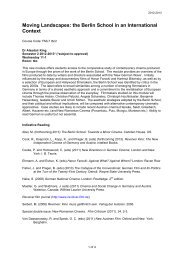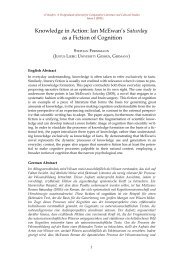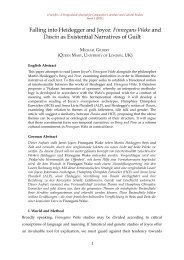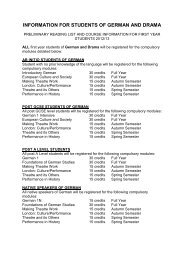Student Handbook - The School of Language, Linguistics and Film
Student Handbook - The School of Language, Linguistics and Film
Student Handbook - The School of Language, Linguistics and Film
You also want an ePaper? Increase the reach of your titles
YUMPU automatically turns print PDFs into web optimized ePapers that Google loves.
• Interact with a degree <strong>of</strong> fluency <strong>and</strong> spontaneity, <strong>and</strong> give clear detailed<br />
presentations on a range <strong>of</strong> relevant subjects, exp<strong>and</strong>ing <strong>and</strong> supporting ideas with<br />
subsidiary points <strong>and</strong> relevant examples<br />
• Produce clear, detailed text on a wide range <strong>of</strong> subjects; synthesise <strong>and</strong> evaluate<br />
information <strong>and</strong> arguments from a number <strong>of</strong> sources <strong>and</strong> explain a viewpoint on a<br />
topical issue giving the advantages <strong>and</strong> disadvantages <strong>of</strong> various options<br />
• Write an essay with a relatively high degree <strong>of</strong> grammatical control which develops<br />
an argument systematically, using a limited number <strong>of</strong> cohesive devices to produce<br />
clear, coherent discourse<br />
Stage 5: At this stage students are expected to:<br />
• Underst<strong>and</strong> <strong>and</strong> recognise a wide range <strong>of</strong> idiomatic expressions <strong>and</strong> colloquialisms<br />
<strong>and</strong> a wide range <strong>of</strong> dem<strong>and</strong>ing, longer texts, <strong>and</strong> recognise implicit meaning<br />
• Express him/herself fluently <strong>and</strong> spontaneously without much obvious searching for<br />
expressions, <strong>and</strong> give detailed presentations on complex subjects, integrating subthemes<br />
• Use language flexibly <strong>and</strong> effectively for social <strong>and</strong> academic purposes<br />
• Produce clear, well-structured, detailed text showing a high degree <strong>of</strong> grammatical<br />
accuracy, on complex subjects, underlining the relevant issues, showing controlled<br />
use <strong>of</strong> organisational patterns, connectors <strong>and</strong> cohesive devices<br />
Stage 6: At this stage students are expected to:<br />
• Underst<strong>and</strong> with ease virtually everything heard or read whether live or broadcast<br />
• Summarise information from different spoken <strong>and</strong> written sources, give critical<br />
appreciation <strong>of</strong> relevant material, reconstructing arguments <strong>and</strong> accounts in a<br />
coherent presentation<br />
• Exploit a comprehensive <strong>and</strong> reliable mastery <strong>of</strong> a very wide range <strong>of</strong> language to<br />
formulate thoughts precisely <strong>and</strong> maintaining consistent grammatical control <strong>of</strong><br />
complex language; express him/herself spontaneously <strong>and</strong> very fluently using an<br />
effective logical structure <strong>and</strong> differentiating finer shades <strong>of</strong> meaning, even in more<br />
complex situations, in order to eliminate ambiguity<br />
Marking criteria for undergraduate work<br />
Since the criteria used in judging language modules are rather different from those used in<br />
judging non-language work (modules on literature/culture, linguistics <strong>and</strong> film), they are<br />
outlined in separate sections below.<br />
Criteria for marking modules on literature/ culture, linguistics <strong>and</strong> film<br />
Examiners bear in mind a number <strong>of</strong> different criteria when determining what mark to award.<br />
One relates to the coverage <strong>of</strong> the particular topics or questions addressed: relevant issues<br />
should be identified <strong>and</strong> implications addressed. You are expected to display an<br />
underst<strong>and</strong>ing <strong>of</strong> relevant criticism. Argumentation is expected to be clear, consistent <strong>and</strong><br />
balanced, <strong>and</strong> should be supported by relevant evidence <strong>and</strong> exemplification. Depending on<br />
the nature <strong>and</strong> difficulty <strong>of</strong> the topic, an appropriate level <strong>of</strong> originality, imagination, insight or<br />
ingenuity in exemplification, argument, approach, problem statement or solution is expected.<br />
From a presentational point <strong>of</strong> view, work should be neat <strong>and</strong> tidy, clearly structured, well<br />
written, precise <strong>and</strong> directly relevant to the topic, without unnecessary digression or errors in<br />
spelling or grammar, with proper attention to presentation <strong>of</strong> examples, citation <strong>and</strong> the form<br />
in which bibliographical information is presented. Technical terms should be used correctly.<br />
Conciseness is important (e.g., length restrictions should be adhered to).<br />
52







